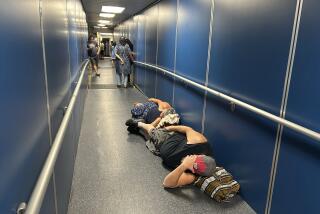Many U.S. Firms Keeping Their Guard Up Over Y2K
- Share via
Despite official assurances that there is nothing to fear from the year 2000 computer problem, unusual precautions are being taken by businesses that underscore their continuing uncertainty over the potential for a great glitch.
Although hundreds of billions of dollars have been spent to repair Y2K problems in computer systems around the world, few companies or agencies are letting down their guard as the new year looms.
Even for companies that have long ago finished repairing and testing their systems, there still remains an uncertainty about Y2K because of wild cards outside their control. The problem is a basic disconnect between what companies actually know about their own repair work and what they don’t know about everyone else around them.
Large-scale risk avoidance is apparent around the country. Consider that:
* In Institute, W. Va., chemical giant Rhone-Poulenc has decided to stop production of methyl isocyanate--the chemical involved in the fatal 1984 incident in Bhopal, India--a week before the new year.
* Singapore Airlines has canceled or rescheduled all its flights around New Year’s Day to make sure that no planes are in the air at midnight.
* Electricity producers will make extra power available. Southern California Edison is preparing to have an additional 800 workers staffing power substations and generating plants through the wee hours of New Year’s Day in case of problems.
* The Federal Reserve has printed up $50 billion in extra currency to avoid any shortages that could cause financial panic. Meanwhile, major corporations are avoiding financial moves at year-end that could leave them exposed to disruptions.
* Major newspapers, including the Los Angeles Times, will start their presses earlier than normal on Dec. 31 and plan to get delivery trucks on the road in advance of any snafus that could tie up local roads.
James Boyd, a spokesman in Los Angeles for Singapore Airlines, said that an international flight could travel over a dozen countries--not all of which may be ready for the transition to the year 2000.
“We’re confident of our own systems, but we’re an international carrier,” he said. “Any flight requires layers and layers of systems to work in perfect synchronization. We’re also very conservative.”
Given the tightly woven web of dependencies that make up modern business, from just-in-time delivery to outsourcing, a major corporation may rely on hundreds or thousands of suppliers to do business. And these complex dependencies are the biggest unknown in the Y2K issue.
Indeed, according to a survey of nearly 1,000 companies last month by CIO magazine, only about half said that their suppliers were ready for the year 2000.
Bruce McConnell, director of the United Nations’ International Year 2000 Cooperation Center, said that small computer failures will inevitably occur after Jan. 1 and these may accumulate in the weeks that follow. “I don’t see the year 2000 causing big outages, but over a period of days and weeks, some systems just won’t work as well,” he said. “It’s impossible to predict what will happen, but it could be like a lingering fever.”
The year 2000 problem stems from the long-standing computer programming tradition of using only two digits to represent years. In 2000, the date “00” could be interpreted as “1900” by some programs, resulting in the possibility of miscalculations, malfunctions or complete shutdowns.
These two-digit dates are now found in countless programs for mainframes and personal computers as well as inside the programming of many microprocessors used to control such “smart” devices as automated factory machines and power plant equipment.
After years of high anxiety over the Y2K problem, public perception of the computer glitch seems to have swung in the opposite direction recently. The latest Gallup Poll on the issue, conducted in August in partnership with USA Today and the National Science Foundation, found that 86% of 1,014 people questioned felt that there would be only minor or no problems caused by Y2K.
Much of the current calm is a product of the real progress made by businesses and government agencies in fixing the problem, particularly in the United States. Part of the proof of their success is the lack of failures that have occurred this year in computer systems working with fiscal years or forecasting into the future.
Critical dates, such as the Oct. 1 start of the federal fiscal year, have come and gone, causing barely a ripple.
But Kazim Isfahani, senior Y2K analyst for Giga Information Group, a technology research and consulting firm, said the passage of these critical dates indicates only partial success.
The problem is large and complex and no one is sure what the impact will be if many failures occur simultaneously on Jan. 1, he said.
In many industries such as airlines, health care and chemical manufacturing, the margin for error is very slim and even the most optimistic managers say that there is no complete guarantee that everything has been fixed.
John Ogens, director of the year 2000 program for Monsanto Co., said his company, like many others, will pause some operations in the period around New Year’s Day.
His biggest concern is the possibility of a power outage. Even though Monsanto has completed all its Y2K repairs and is confident of its local utilities, there is still the possibility that power problems rippling across the electrical grid could damage equipment or create other unsafe situations.
“We don’t have a high level of concern, but there are no guarantees,” he said. “So we’re just going to go the extra step and go into pause mode.”
Ogens said that only six to eight Monsanto facilities will halt their operations, such as one of the company’s herbicide plants in Muscatine, Iowa. There, production of its Roundup weedkiller product will stop eight hours before midnight and will not start up again until eight hours after midnight.
“This is just an extra hedge against a possible utility problem,” Ogens said.
John Abrams of Rhone-Poulenc said his company’s decision to idle its methyl isocyanate plant was also made in part to ease concerns in the surrounding community about potential problems.
Its West Virginia plant will shut down a week before New Year’s Day and then slowly be brought back into service over several days.
“You’re dealing with hazardous material so you want to go the extra mile,” he said. “We want the community to feel safe.”
Denver-based Frontier Airlines is suspending 52 domestic flights on Dec. 31 and Jan. 1, largely because of low bookings but also to avoid unknown risks.
Frontier official Elise Eberwein said power disruptions at an airport, problems with fuel suppliers or malfunctions in outside computer systems are all possibilities that could cause problems for the airline.
“Ninety percent of these cancellations are just because of lack of bookings,” she said. “But there are concerns about year 2000, since we are so dependent on third-party suppliers.”
Safety is only one concern.
Eric Trapp, year 2000 program manager for Southern California Edison, said that the Y2K issue is so touchy that any power problems on New Year’s Day could set off a panic--even if the problems were caused by something as mundane as a winter storm or a downed power pole.
“People would just assume it is a year 2000 problem,” Trapp said. “They could think, ‘Uh-oh, this is the nationwide blackout that all the doom-and-gloomers are predicting.’ ”
Major utilities have agreed to have extra power available and to reduce the exchange of power across networks to make sure local problems will not be able to become regional ones. Their efforts will be aided by the fact that winter is one of the lowest periods of electric power usage.
But even with these precautions, Trapp said Southern California Edison will deploy 800 extra workers to make sure it can solve any problem quickly.
“We want to be super effective because of the public perception,” he said.
For all the preparations, the biggest unknown in the equation is not technological, but rather human. Panic, fear or even excessive exuberance could threaten the most thorough of contingency plans.
Phone company GTE Corp., along with most other major carriers, has been mailing out a message with its monthly bills asking its 16 million customers not to pick up the phone at the stroke of midnight. The company expects one of the heaviest calling loads ever.
“The nation’s phone system is just not designed for everyone in Southern California to pick up the phone at the same time,” said GTE spokesman Bill Kula.
* U.S. CALLED A-OK for Y2K
Commerce Dept. report says the worst of Y2K problem--preparing for it--is over. A16







